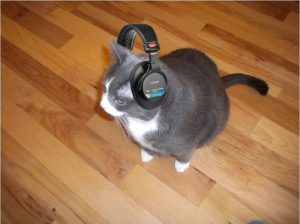Evolution
In Series Two of Monty Phython’s Flying Circus, originally broadcast by the BBC between 15 September 1970 and 22 December 1970, there is a skit entitled “The Tale of the Piranha Brothers.” A few minutes into the skit, there is a segment, which is not presented in the printed transcripts of the skit, but which is included in the televised version of the skit.
In this segment of the skit, Terry Jones plays a television reporter speaking with a man on the pavement (sidewalk) out-of-doors in front of several terraced houses. Various neighbors witness the episode. In this portrayal, Jones, the reporter, with a hand-held microphone, is interviewing a resident of the area, (Graham Chapman). When Jones asks a question of Chapman, he, Jones, holds the mike to Chapman. When Chapman replies, Jones holds the mike to his own face. Thus the audience hears nothing of the questions or answers. Instead, the audience is treated to some 47 seconds of hilarious gestures, facial expressions, and other body language.
This is one of my favorite Monty Phython skits. Over the years it has inspired me to contemplate a variation which I myself might use to create a skit of my own based on its concept. This, in turn, has given birth to “Operatic Interviews.” My Opus 1, which is presented in this recording, is the first in what is intended to be a series of several such Interviews.
My Interviews envision me speaking with or to individuals or a group. In Opus 1, I act as a television personality conducting an interview with a famous opera soprano and likewise with a famous conductor of opera. I hold a microphone to my own face and ask questions (which are heard by the audience). For answers, I then direct the mike to my right or to my left, to the imaginary soprano or conductor. These “persons” answer by means of vocal passages from recordings of opera. Then back to me for the next question, and so forth.
The production of my Opus 1, although recorded with the help of a professional sound engineer, was completed under constraints of time and money. The sound is not of the highest quality. Some of the recordings used were CDs, but others were LPs. So, it is what it is. Those who hear this skit will probably find some of my Q and As humorous. Others may just find the whole thing silly.
My purpose in producing Opus 1 of this series is not to make fun of music. Indeed, for a listener to fully respond to the skit requires a high level knowledge of opera. For a fully informed response to any given question and answer, the listener must go through a three-step mental process:
1. The listener must actually know and be able to identify the piece of recorded music. Some answers are only seconds long, and some recorded segments may not be readily identifiable, but most should be sufficiently familiar to one knowledgeable of opera.
2. The listener must be aware of the context of the recorded segment in relation to its original opera–the character(s) singing the music and its significance to the plot of the opera.
3. Being aware of the source and context of the recorded answer, the listener must then decide if he/she finds the answer amusing in response to my interview question.
In addition, I have tried to insert into my commentary other attempts at humor–which may or may not be successful.
Since this is not a quiz question, and I hope my audience will find at least a degree of pleasure from this skit, at the end of these remarks I provide a list of the musical selections I have used. For those segments I present, which were not familiar to you at first hearing, perhaps, by reference to this list you will see my intended nexus between question and answer, and hopefully you will then understand my intended element of humor.
Stop Here
Don’t Cheat.
Listen to the recording first, then, if you wish, consult the Play List to check your identification of the musical answers.
When the CD is ended, to return to the remainder of this post click on the Back Arrow at the top upper left corner of the background page.
If there is a favorable reaction to this skit, for me to produce my envisioned additional recordings in this series will involve substantial time and money. I look forward to such an undertaking, but, as a practical matter, could do so only if I have an audience which would support such a venture. Please let me know if you enjoyed my Opus 1 and if you would be interested to hear further episodes.
In my proposed Opus 2, “The Maitre d’,” I shall, as that Maitre d’, greet and seat guests in my restaurant, ask them questions, and comment on their status and answers. Obviously, the subject matter of such spoken and recorded elements will relate to food and drink to be served at the restaurant.
In my proposed Opus 3, “The Corporate Annual Meeting,” I, at the podium on stage, as the Chairman of the Board of a fictional company at its Annual Meeting, will introduce various people, and announce certain activities of the corporation–its performance over the past year and its projections for the coming year. (For this segment, I would take the liberty of including some recordings from oratorio as well as those from opera.)
The Play List
| 1. | Wagner | Tristan und Isolde |
| 2. | Giordano | Andrea Chénier |
| 3. | Puccini | La Bohème |
| 4. | Puccini | Tosca |
| 5. | Berlioz | Les Troyens |
| 6. | Wagner | Tannhäuser |
| 7. | Mozart | Don Giovanni |
| 8. | Mozart | Don Giovanni |
| 9. | Verdi | Aïda |
| 10. | R. Strauss | Arabella |
| 11. | Gounod | Faust |
| 12. | Verdi | Otello |
| 13. | Leoncavallo | Pagliacci |
| 14. | Puccini | Turandot |
| 15. | von Weber | Der Freischutz |
| 16. | Mozart | Die Zauberflöte |
| 17. | R. Strauss | Salome |
| 18. | Verdi | Otello |
| 19. | Puccini | La Bohème |
| 20. | Mussorgsky | Boris Godunov |
| 21. | Puccini | Tosca |
| 22. | Menotti | The Medium |
| 23. | Verdi | Aïda |
| 24. | Verdi | La Forza del destino |
| 25. | Gounod | Faust |
| 26. | Verdi | Otello |
| 27. | Puccini | La Bohème |
| 28. | Verdi | Aïda |
| 29. | Verdi | Rigoletto |
| 30. | Donizetti | Lucia de Lammermoor |



